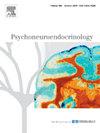Forgiveness in the HPA axis: The roles of cumulative genetic effects and cortisol reactivity in trait and situational forgiveness
IF 3.4
2区 医学
Q2 ENDOCRINOLOGY & METABOLISM
引用次数: 0
Abstract
Trait and situational forgiveness are vital coping mechanisms and stress responses in the face of interpersonal transgressions. The hypothalamic-pituitary-adrenal (HPA) axis plays a key role in regulating these strategies in response to such transgressions. Building on this foundation, Study 1 examined the impact of cumulative genetic effects of the HPA axis (i.e., a weighted measure of genetic predisposition, calculated by combining the relative contributions of multiple genetic polymorphisms and the number of protective alleles associated with positive psychological traits) on trait forgiveness (N = 852). Study 2 investigated the relationship between these genetic effects, cortisol reactivity, and forgiveness responses following romantic partner conflict (N = 200). Results from Study 1 revealed that higher cumulative genetic scores were associated with stronger trait forgiveness. Study 2 showed that individuals with the higher cumulative genetic scores exhibited more forgiveness responses toward their partners after conflict. Moreover, participants who experienced stronger negative emotions and greater cortisol reactivity were more likely to exhibit forgiveness responses toward their partners. These findings highlight the biological mechanisms underlying forgiveness, emphasizing how genetic and physiological factors of the HPA axis shape adaptive interpersonal coping strategies.
宽恕在下丘脑轴:累积遗传效应和皮质醇反应在特质宽恕和情境宽恕中的作用
特质性宽恕和情境性宽恕是人际越轨行为的重要应对机制和应激反应。下丘脑-垂体-肾上腺(HPA)轴在调节这些策略以应对此类越轨行为中起关键作用。在此基础上,研究1检验了HPA轴的累积遗传效应(即遗传易感性的加权指标,通过结合多个遗传多态性的相对贡献和与积极心理特征相关的保护性等位基因的数量来计算)对性状宽恕的影响(N = 852)。研究2调查了这些遗传效应、皮质醇反应和恋爱伴侣冲突后的宽恕反应之间的关系(N = 200)。研究1的结果显示,较高的累积遗传分数与较强的性状宽恕相关。研究2表明,累积遗传得分较高的个体在冲突后对伴侣表现出更多的宽恕反应。此外,经历更强烈的负面情绪和更大的皮质醇反应的参与者更有可能对他们的伴侣表现出宽恕的反应。这些发现突出了宽恕的生物学机制,强调了HPA轴的遗传和生理因素如何塑造适应性人际应对策略。
本文章由计算机程序翻译,如有差异,请以英文原文为准。
求助全文
约1分钟内获得全文
求助全文
来源期刊

Psychoneuroendocrinology
医学-精神病学
CiteScore
7.40
自引率
8.10%
发文量
268
审稿时长
66 days
期刊介绍:
Psychoneuroendocrinology publishes papers dealing with the interrelated disciplines of psychology, neurobiology, endocrinology, immunology, neurology, and psychiatry, with an emphasis on multidisciplinary studies aiming at integrating these disciplines in terms of either basic research or clinical implications. One of the main goals is to understand how a variety of psychobiological factors interact in the expression of the stress response as it relates to the development and/or maintenance of neuropsychiatric illnesses.
 求助内容:
求助内容: 应助结果提醒方式:
应助结果提醒方式:


